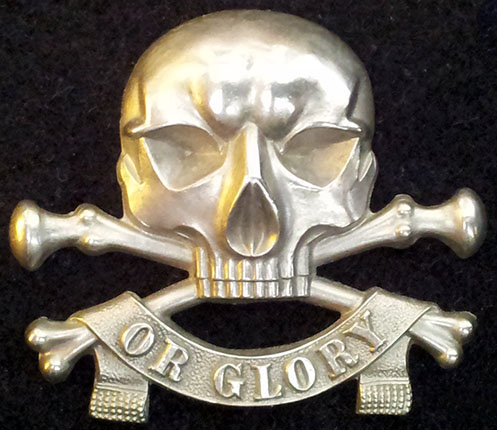
17th Lancers Cap Badge. Source: Wikipedia.
The Crimean War (1854–1856) was the result of economic, religious and political differences between Turkey and Russia, and the determination of England and France to curb Russia’s expansionism. It was one of the bloodiest wars of the nineteenth century although far more British soldiers died from typhoid, cholera and dysentery than from enemy action. Francis Dickinson was a Troop Sergeant Major in the 17th Lancers, known as ‘The Glory Boys’. His headstone, now lost, was inscribed ‘One of the Six Hundred’, a quotation from Tennyson’s famous poem ‘The Charge pf the Light Brigade’. He was buried with full military honours when he died in 1898, aged 68. The 17th Lancers were in the front line of cavalry on the left flank during the Charge of the Light Brigade at the Battle of Balaclava in October 1854. The brigade drove through the Russian artillery before attacking the Russian cavalry and pushing them back. They were unable to consolidate their position because of insufficient forces and had to withdraw, coming under further attack as they did so. Francis Dickinson also fought in the Crimean battles of Alma, Inkerman and Sebastopol.
In 1857 his regiment was sent to India where he was involved in the defeat of the Indian Rebellion (Indian Mutiny). It was in India that he met his wife. When he was discharged after 24 years’ service in 1870 his troop presented him with an engraved silver goblet and other mementos of his campaigns. One of these was some hair from the horse belonging to a rebel leader in Central India because he had formed part of the execution escort. In Sheffield Francis Dickinson was a well-known member of the Crimean and Indian Mutiny Veterans Association and for many years ran the Earl Grey public house on Ecclesall Road. Francis Dickinson’s service medals are now stored at Weston Park Museum. He was buried in plot P2 63 in the Anglican area of the Cemetery.



